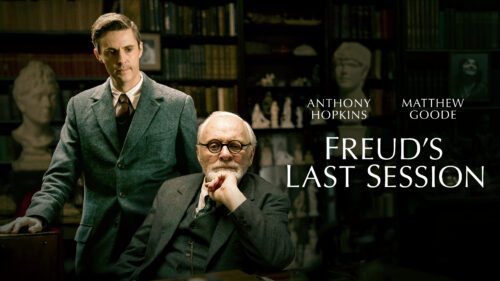Freud’s Last Session
Cast: Anthony Hopkins, Matthew Goode, Jeremy Northam, Liv Lisa Fries, Aidan McArdle, Stephen Campbell Moore, Padraic Delaney, Jodi Balfour
Director: Matthew Brown
Run Time: 109 minutes
With Anthony Hopkins in his mid-80s and a 55-year career playing Sigmund Freud, who can resist? It seemed he never met Christian apologist and fantasy author, Oxford CS Lewis, but veteran psychologist Arnold M. Nicholi wrote a book, The Question of God, placing the arguments of each in juxtaposition, compare and contrast. In 2012, playwright Mark St Germain wrote a play, drawing on The Question of God book and some information that before his death Freud met an Oxford don (not identified).
So, with the collaboration of the playwright, here is a film version of the play. For those interested in Freud, a great deal on his perspectives on psychoanalysis and, as expected, his views on sexuality. For those interested in Lewis, a great deal on his conversion experience, his sense of the presence of God. Freud was about to die. Lewis was to have an impactful career in broadcast, writing, Christianity, the Chronicles of Narnia…
It is September 3, 1939. Hitler has invaded Poland. Chamberlain will declare war on Germany. The atmosphere in London is tense, parents and children flocking to railway stations to evacuate the children, and air raid siren and shelter, planes flying overhead. In terms of a World War II film, this is an excellent evocation, filmed with muted colour.
Freud is living in Finchley, having fled Vienna the year earlier with his daughter, Anna, herself a reputable psychoanalyst, especially for children, who lectures in London. Freud has cancer of the mouth and is in pain. He’s also listening to the radio, wanting to hear the news about the war. And he has agreed for CS Lewis to visit him, even though the two have opposing views.
While most of the action takes place in Freud’s office/den, the play has been opened out with great impact, dramatised flashbacks to the early life of each of the men, Freud’s life and work in Vienna, his reputation, his refuge in England. With Lewis, there is his childhood, parents, but especially the experience of the trenches, death of a friend, wounded, the siren and shelter evoking memories of trench terror. Through these flashbacks and the consequent conversations, we learn a great deal about the two men.
While the two meet, there is quite some hostility between them, Freud and his atheism, his free thinking about sexuality and pleasure, while Lewis is rather more buttoned up, eager to defend belief in God. Which means there are many interesting conversations, Freud and his quips and putdowns, Lewis more aggressive at times. In fact, what we see is an incipient psychoanalysis by Freud of Lewis, not just what he says but what he doesn’t say. And, as the two interact, there are psychoanalyst intimations about Freud himself, especially about his relationship with his daughter, Anna, and Lewis’s attack on their co-dependence.
For those who side with Freud, the film will confirm their beliefs. They will not be persuaded by Lewis. However, those who side with Lewis, will appreciate his sense of the presence of God, a final dream as he nods off on the train back to Oxford, a forest full of bright light, transcendent light. But Lewis does tell Freud that God is often incognito in the world.
Interesting writing, top performances, a film with substance and intelligent challenge.
Fr Peter Malone MSC
Published: 26 April 2024





Comments
Add Comment